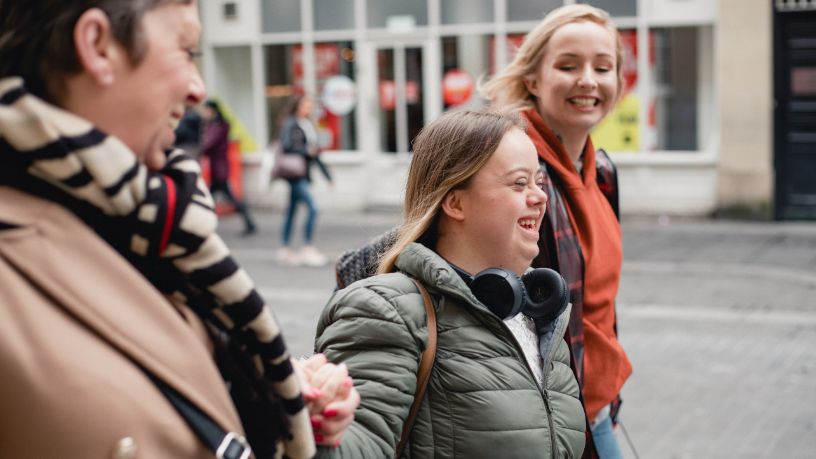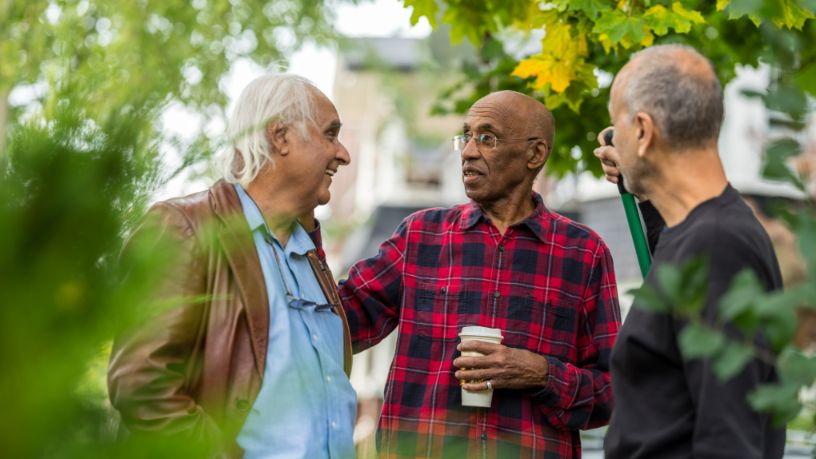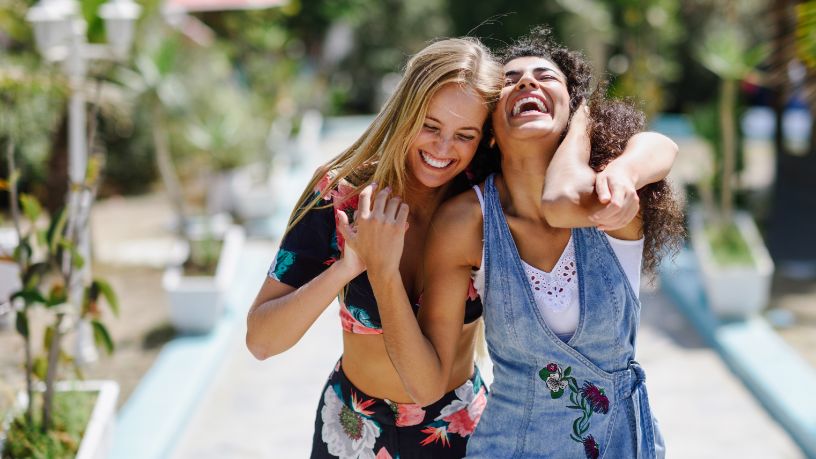Not all disabilities are immediately obvious.
Key takeaways
Nic shares the strategies he developed over time to help him remain independent.
Read Nic’s story and discover why a person should not be defined by their disability.
When people meet Nic Hoskins for the first time, they usually have no idea he’s living with a disability. While he has enough functional sight to manage most activities with the help of technology, Nic has low vision in both eyes.
“I’m fine to generally get by,” says Nic. “I can manage in social situations, in the workplace and can walk around without bumping into anything. But it’s that finer detail that I really struggle with. That means that people often don't realise, immediately at least, that I have a disability. You get to experience both sides of what it's like, before and after people realise.”
Nic adds that this confusion around his disability can lead to tricky situations. “Such as strangers in passing asking you to look where you’re going.”
“I’ve also had situations where an acquaintance might try to show me something on their phone, or a story behind a tattoo, and I’ll decide to either explain or just nod along politely.”
Nic’s disability is invisible. And he wants people to see that those living with an impairment are much more than the barriers they face.
Nic's story
Nic can’t remember seeing the world differently. He was a toddler when he lost much of his vision.
His impairment was caused by neuroblastoma, a rare nerve cancer that usually affects children under the age of 5.1
A surgery to the back of his eye damaged parts of the optic nerve, meaning that while his eyes are technically fine, there’s a problem in the transmission of signals between his eyes and brain.
“It's almost like you've got a dodgy cord that's not sending the signal over to the TV,” says Nic. “So you can’t actually watch it. Glasses won’t fix it.”
Nic can, however, see certain things.
“If you move your hand in front of me, I can tell that something's moved. But I couldn't tell you what it was,” he says. “In my other eye, I can see the first few lines on a vision chart.”
While technology makes a big difference in Nic’s current life (helping him to work, use public transport and read a menu), things were a little different when he was at school.
He recalls using a magnifying glass and piece of A3 paper to complete his work. “There were no iPads or anything like that.”
"Some of the other challenges were being pulled out of class when I maybe could have gotten by,” he adds. “It definitely has some subtle impacts on how you get along with your friends. As a kid, when you’re doing something different, that's quite significant. There's definitely an impact on relationships and your self-confidence.”
Finding solutions
Nic is very independent and has developed a range of coping mechanisms to get by. He says it’s all about finding different solutions to different problems.
“I used to live in Brisbane,” he says. “I could get around on my own most places, to classes or on public transport. If I was going somewhere I hadn’t been before, I’d just follow the little dot on Google Maps and get off when I’d needed to. Technology is amazing!”
“But what works for me might not work for someone else,” Nic adds.
This is because no 2 disabilities are the same.
“None of the technology is made for you, so you still have to learn it for yourself,” says Nic. “That’s one of the biggest challenges that people with a sensory impairment or a physical disability, like hearing loss, vision loss and those in a wheelchair would have to experience.”
There are only a few things Nic needs help with.
“If there’s no public transport, I'll have to ask a friend to come pick me up and drive me somewhere,” he says. “Or if someone has served me food, I might have to ask what’s on my plate.”
“If I duck away from my friends before we’re seated at a restaurant, they’ll call out to me, so I know where they are as I’m making my way through the crowd. It’s a little embarrassing, but it works,” Nic adds.
“I have ways of coping and working with the eyesight I have, like using the zoom function on the computer to be able to work and taking a photo of the menu at a restaurant to be able to read what's on it.”
Breaking through barriers
Nic is a Capability Development Facilitator at Bupa, where he’s worked for a few years now training new starters at Bupa’s health insurance contact centres and retail stores.
But getting a career break didn’t come easily to Nic. After university, he volunteered at Vision Australia, where he earned a 12-month sponsorship.
“[It] was a great opportunity to be able to prove my skills and show that the barrier that I have wasn’t a barrier for the role,” says Nic.
In an ideal world, Nic hopes that people living with disabilities won’t have to prove they can break those barriers.
I think that we should be more trusting of the abilities that people have and give them those opportunities, so they don't have to muscle their way in, like I've experienced.
“If someone is able and they're wanting to build their career, getting out there and getting started is the best bet to help build those career skills for young people, whether that's studying, doing an internship or volunteering.”
“It’s important employers give people with disabilities meaningful opportunities to really prove themselves.”
Advocating for change
As head of the Access and Inclusion Network at Bupa, Nic is an advocate for change and understanding.
At first, however, he wasn’t sure that he had much to add to the conversation.
“The more that I got involved and participated, the more I saw that I really was an expert in this area,” he says. “I came to realise not everyone has been able to help themselves in the way that I have, even though they’re perfectly capable of it, due to the societal barriers they’ve faced.”
Nic now encourages others to look at their situations differently, and to utilise technology and other strategies.
“A big part of disability is learning to accept what you have and who you are,” he says. “It’s also learning how to get the right things out of social situations, job applications, how to put yourself across the right way.”
“I'm glad that I’m able to have a voice, to share my experience and advocate for change.”

At Bupa, trust is everything
Our health and wellbeing information is regularly reviewed and maintained by a team of healthcare experts, to ensure its relevancy and accuracy. Everyone's health journey is unique and health outcomes vary from person to person.
This content is not a replacement for personalised and specific medical, healthcare, or other professional advice. If you have concerns about your health, see your doctor or other health professional.
1Cleveland Clinic. (2020). Neuroblastoma. Cleveland Clinic.
You might also like...
Having better conversations with someone living with a disability
When it comes to talking to someone living with a disability, words matter. Discover our top 5 dos and don’ts for having respectful conversations.
Cataracts: The basics
Cataracts is a leading cause of vision impairment, and the risk of developing it grows as you do. But the condition can be managed and even prevented.
Adult ADHD: The second opinion that changed my life
Kate had to navigate a long, hard road until she received a diagnosis that would change her life for the better. Here is her story.
Kath Ebbs: 5 self-care tips for your mental health
When it comes to your mental health, it’s important to have a solid self-care routine. Check out Kath Ebbs’ top 5 tips for getting yours on track.





